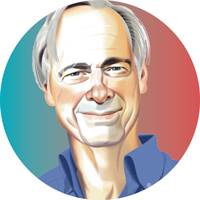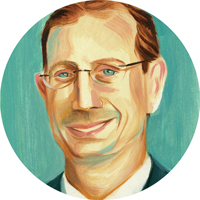#9 Mistakes
Masters of Mistakes
A single quality unites the best-of-the-institutional-investing-best, in our experience, and it’s not a lack a mistakes. It’s a team culture that recognizes screw-ups, and learns from them. And that always starts at the top.Â
 Â Ray Dalio, Co-CIO and Founder, Bridgewater Associates
 Ray Dalio, Co-CIO and Founder, Bridgewater Associates
“I’m a professional mistake maker—one-third of my trades are probably wrong. The markets taught me humility. I’ve learned to find the smartest people I know who disagree with me, and see the situation through their eyes. I think the greatest tragedy of all time is that people keep wrong thoughts, wrong opinions in their minds. This is the biggest problem with mankind. The biggest antidote is thoughtful disagreements. Would you like to know your weaknesses? Do you mind showing people what’s going on? How many think that basically this is logical? There’s no good reason for not operating that way.Â
Pain indicates that something is wrong, and I’ve found my best learnings came from painful experiences. But it’s only psychologically hard. Once you get that in your mind, there’s no reason for these experiences to be painful. Bridgewater’s culture is like a family: It takes some getting used to. Some make it, some don’t.”
Source: Milken Global Conference Q&A, May 2, 2016, Los Angeles
 Â Mark Wiseman, former CEO, Canada Pension Plan Investment Board; Head of Global Active Equities, BlackRock (effective September 2016)
 Mark Wiseman, former CEO, Canada Pension Plan Investment Board; Head of Global Active Equities, BlackRock (effective September 2016)
“Claude Lamoureux—the former president and CEO of [Ontario] Teachers’—would say there are two types of investment mistakes: errors of commission versus errors of omission. The first is when an investment turns out poorly. It’s easy to spot. You’ve lost money—sometimes all your money. Most investment professionals spend less time thinking about the second type: Where did we not bid? Where could we have stretched for an investment, but didn’t? As Claude taught me, the second type of errors is just as costly to an organization as the first. And when I think of my career, I believe errors of omission have been far more costly.
In terms of management, the biggest errors are people errors. They arise from compromising on culture. The mistakes I’ve made have largely been where I’ve hired someone, looked at their talent, but not spent enough time on the other aspects. Who are they as a manager and as a person? The amount of damage someone can cause who’s not a cultural fit is immeasurable.”
Source: CPPIB’s Wiseman on Mistakes, Hockey, and the Birth of the Canadian ModelÂ

